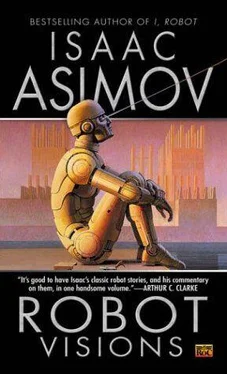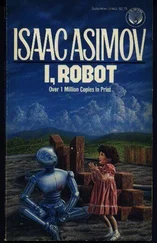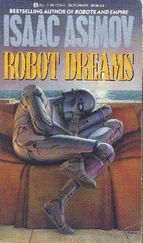Isaac Asimov - Robot Visions
Здесь есть возможность читать онлайн «Isaac Asimov - Robot Visions» весь текст электронной книги совершенно бесплатно (целиком полную версию без сокращений). В некоторых случаях можно слушать аудио, скачать через торрент в формате fb2 и присутствует краткое содержание. Жанр: Фантастика и фэнтези, на английском языке. Описание произведения, (предисловие) а так же отзывы посетителей доступны на портале библиотеки ЛибКат.
- Название:Robot Visions
- Автор:
- Жанр:
- Год:неизвестен
- ISBN:нет данных
- Рейтинг книги:5 / 5. Голосов: 1
-
Избранное:Добавить в избранное
- Отзывы:
-
Ваша оценка:
- 100
- 1
- 2
- 3
- 4
- 5
Robot Visions: краткое содержание, описание и аннотация
Предлагаем к чтению аннотацию, описание, краткое содержание или предисловие (зависит от того, что написал сам автор книги «Robot Visions»). Если вы не нашли необходимую информацию о книге — напишите в комментариях, мы постараемся отыскать её.
Robot Visions — читать онлайн бесплатно полную книгу (весь текст) целиком
Ниже представлен текст книги, разбитый по страницам. Система сохранения места последней прочитанной страницы, позволяет с удобством читать онлайн бесплатно книгу «Robot Visions», без необходимости каждый раз заново искать на чём Вы остановились. Поставьте закладку, и сможете в любой момент перейти на страницу, на которой закончили чтение.
Интервал:
Закладка:
Prosecution said, “Did you oppose employment of Robot EZ-27 by the university?”
“I did, sir.”
“Why was that?”
“I did not feel that we understood the-uh-motives of U. S. Robots thoroughly. I mistrusted their anxiety to place the robot with us.”
“Did you feel that it was capable of doing the work that it was allegedly designed to do?”
“I know for a fact that it was not.”
“Would you state your reasons?”
Simon Ninheimer’s book, entitled Social Tensions Involved in Space-Flight and Their Resolution, had been eight years in the making. Ninheimer’s search for precision was not confined to his habits of speech, and in a subject like sociology, almost inherently imprecise, it left him breathless.
Even with the material in galley proofs, he felt no sense of completion. Rather the reverse, in fact. Staring at the long strips of print, he felt only the itch to tear the lines of type apart and rearrange them differently.
Jim Baker, Instructor and soon to be Assistant Professor of Sociology, found Ninheimer, three days after the first batch of galleys had arrived from the printer, staring at the handful of paper in abstraction. The galleys came in three copies: one for Ninheimer to proofread, one for Baker to proofread independently, and a third, marked “Original,” which was to receive the final corrections, a combination of those made by Ninheimer and by Baker, after a conference at which possible conflicts and disagreements were ironed out. This had been their policy on the several papers on which they had collaborated in the past three years and it worked well.
Baker, young and ingratiatingly soft-voiced, had his own copies of the galleys in his hand. He said eagerly, “I’ve done the first chapter and it contains some typographical beauts.”
“The first chapter always has them,” said Ninheimer distantly. “Do you want to go over it now?”
Ninheimer brought his eyes to grave focus on Baker. “I haven’t done anything on the galleys, Jim. I don’t think I’ll bother.”
Baker looked confused. “Not bother?”
Ninheimer pursed his lips. “I’ve asked about the-uh-workload of the machine. After all, he was originally-uh-promoted as a proofreader. They’ve set a schedule.”
“The machine? You mean Easy?”
“I believe that is the foolish name they gave it.”
“But, Dr. Ninheimer, I thought you were staying clear of it”‘
“I seem to be the only one doing so. Perhaps I ought to take my share of the-uh-advantage.”
“Oh. Well, I seem to have wasted time on this first chapter, then,” said the younger man ruefully.
“Not wasted. We can compare the machine’s result with yours as a check.”
“If you want to, but-”
“Yes?”
“I doubt that we’ll find anything wrong with Easy’s work. It’s supposed never to have made a mistake.”
“I dare say,” said Ninheimer dryly.
The first chapter was brought in again by Baker four days later. This time it was Ninheimer’s copy, fresh from the special annex that had been built to house Easy and the equipment it used.
Baker was jubilant. “Dr. Ninheimer, it not only caught everything I caught-it found a dozen errors I missed! The whole thing took it twelve minutes!”
Ninheimer looked over the sheaf, with the neatly printed marks and symbols in the margins. He said, “It is not as complete as you and I would have made it. We would have entered an insert on Suzuki’s work on the neurological effects of low gravity.”
“You mean his paper in Sociological Reviews?”
“Of course.”
“Well, you can’t expect impossibilities of Easy. It can’t read the literature for us.”
“I realize that. As a matter of fact, I have prepared the insert. I will see the machine and make certain it knows how to-uh-handle inserts.”
“It will know.”
“I prefer to make certain.”
Ninheimer had to make an appointment to see Easy, and then could get nothing better than fifteen minutes in the late evening.
But the fifteen minutes turned out to be ample. Robot EZ-27 understood the matter of inserts at once.
Ninheimer found himself uncomfortable at close quarters with the robot for the first time. Almost automatically, as though it were human, he found himself asking, “Are you happy with your work?’
“Most happy, Professor Ninheimer,” said Easy solemnly, the photocells that were its eyes gleaming their normal deep red.
“You know me?”
“From the fact that you present me with additional material to include in the galleys, it follows that you are the author. The author’s name, of course, is at the head of each sheet of galley proof.”
“I see. You make-uh-deductions, then. Tell me”-he couldn’t resist the question-”what do you think of the book so far?’
Easy said, “I find it very pleasant to work with.”
“Pleasant? That is an odd word for a-uh-a mechanism without emotion. I’ve been told you have no emotion.”
“The words of your book go in accordance with my circuits,” Easy explained. “They set up little or no counterpotentials. It is in my brain paths to translate this mechanical fact into a word such as ‘pleasant.’ The emotional context is fortuitous.”
“I see. Why do you find the book pleasant?”
“It deals with human beings, Professor, and not with inorganic materials or mathematical symbols. Your book attempts to understand human beings and to help increase human happiness.”
“And this is what you try to do and so my book goes in accordance with your circuits? Is that it?”
“That is it, Professor.”
The fifteen minutes were up. Ninheimer left and went to the university library, which was on the point of closing. He kept them open long enough to find an elementary text on robotics. He took it home with him.
Except for occasional insertion of late material, the galleys went to Easy and from him to the publishers with little intervention from Ninheimer at first-and none at all later.
Baker said, a little uneasily, “It almost gives me a feeling of uselessness.”
“It should give you a feeling of having time to begin a new project,” said Ninheimer, without looking up from the notations he was making in the current issue of Social Science Abstracts.
“I’m just not used to it. I keep worrying about the galleys. It’s silly, I know.”
“It is.”
“The other day I got a couple of sheets before Easy sent them off to-”
“What!” Ninheimer looked up, scowling. The copy of Abstracts slid shut. “Did you disturb the machine at its work?”
“Only for a minute. Everything was all right. Oh, it changed one word. You referred to something as ‘criminal’; it changed the word to ‘reckless.’ It thought the second adjective fit in better with the context.”
Ninheimer grew thoughtful. “What did you think?”
“You know, I agreed with it. I let it stand.”
Ninheimer turned in his swivel-chair to face his young associate. “See here, I wish you wouldn’t do this again. If I am to use the machine, I wish the-uh-full advantage of it. If I am to use it and lose your-uh-services anyway because you supervise it when the whole point is that it requires no supervision, I gain nothing. Do you see?”
“Yes, Dr. Ninheimer,” said Baker, subdued. The advance copies of Social Tensions arrived in Dr. Ninheimer’s office on the eighth of May. He looked through it briefly, flipping pages and pausing to read a paragraph here and there. Then he put his copies away.
As he explained later, he forgot about it. For eight years, he had worked at it, but now, and for months in the past, other interests had engaged him while Easy had taken the load of the book off his shoulders. He did not even think to donate the usual complimentary copy to the university library. Even Baker, who had thrown himself into work and had steered clear of the department head since receiving his rebuke at their last meeting, received no copy.
Читать дальшеИнтервал:
Закладка:
Похожие книги на «Robot Visions»
Представляем Вашему вниманию похожие книги на «Robot Visions» списком для выбора. Мы отобрали схожую по названию и смыслу литературу в надежде предоставить читателям больше вариантов отыскать новые, интересные, ещё непрочитанные произведения.
Обсуждение, отзывы о книге «Robot Visions» и просто собственные мнения читателей. Оставьте ваши комментарии, напишите, что Вы думаете о произведении, его смысле или главных героях. Укажите что конкретно понравилось, а что нет, и почему Вы так считаете.








